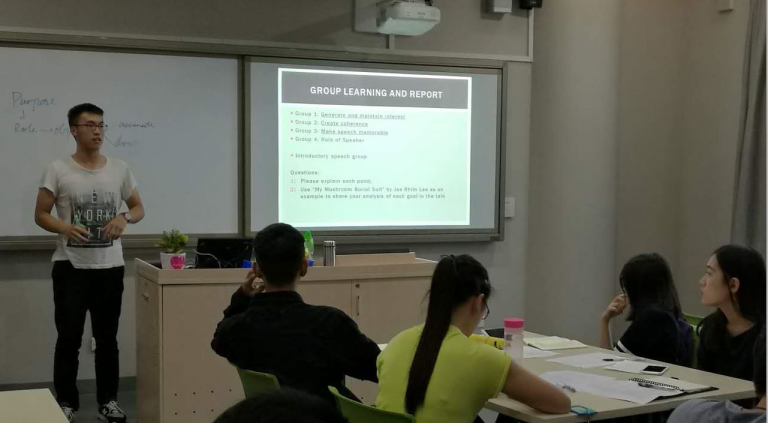This fall, Dr. Zhuo Li from CLE offers a new elective course titled “Fundamentals of Public Speaking” to promote science and technology students’ public speaking skills. This course involves an action research project approved and supported by Department of Education of Guangdong Province. Dr. Li, the principal researcher and two co-researchers, Dr. Yuxiu Hu and Dr. Lisha Liu, strive to explore how flipped classroom model and MOOCs can be effectively used in teaching public speaking in college.
This public speaking course started with an icebreaker requiring all students to do silent interviews in pairs before using verbal language. Comparing the two approaches to communication in this game, the students came to realize the power of speaking in communication. “Science not communicated is science not done,” by Melissa their experience of using verbal language to do interviews following Marshall, a senior lecturer of communication skills to scientists and engineers at Penn State University, is taken as the course motto. Dr. Li says the importance of improving scientific researchers’ communication skills can never be underestimated. Globalization in this information age requires that scientific researchers should not only make innovations but also effectively to communicate about their research with others.
 Students did “silent interviews” in the first class.
Students did “silent interviews” in the first class.
he course delivery is modified to a blended course format using “flipped classroom” model and integrating MOOCs. International collaboration significantly contributes to the course design. This course uses lecture videos from a popular MOOC course on EdX titled “Introduction to Public Speaking” offered by Dr. Matt McGarrity from University of Washington. To obtain the consent for using the lecture videos, Dr. Li contacted Dr. McGarrity, who was very supportive and even generously shared more useful teaching resources. Moreover, the online teaching platform “Sakai” is used for the online components, including each week’s reading materials, lecture videos, and discussion questions. Students are required to finish reading and view videos before class meetings, while in-class time is devoted to group discussions and class speeches/presentations. The students’ midterm and final speeches/presentations will be recorded for their further watching and analysis.
 Students worked in groups to prepare demonstrations of visual aids in public speaking.
Students worked in groups to prepare demonstrations of visual aids in public speaking.
The students in this course are well aware that public speaking skills are critical to their current study, further education, and future career development. Those who have exchange experience abroad appreciate the chance to study the way they encountered abroad. For example, Jiuzhou Wang, a returned exchange student to Georgia Tech thinks this is one of the most rewarding classes he has taken at SUSTech. “We are able to discuss in groups and present to the whole class after previewing the materials before class. In such an engaging way, more learning opportunities for effective communication are created, which reminds of the classes I took in Georgia Tech,” he said.
 Jiuzhou Wang presented in class.
Jiuzhou Wang presented in class.
To enrich the students’ learning experience, Dr. Li has invited an experienced toastmaster from Hong Kong to do a guest speech in the upcoming November. Meanwhile, she is discussing with Dr. McGarrity for a guest talk at SUSTech next spring. In addition, Dr. Li and three sophomores, Jiuzhou Wang, Xizi Ni, Yifan Wu, are working on starting a Toastmasters Club on campus or a similar student club dedicated to improving SUSTech students’ English public speaking.